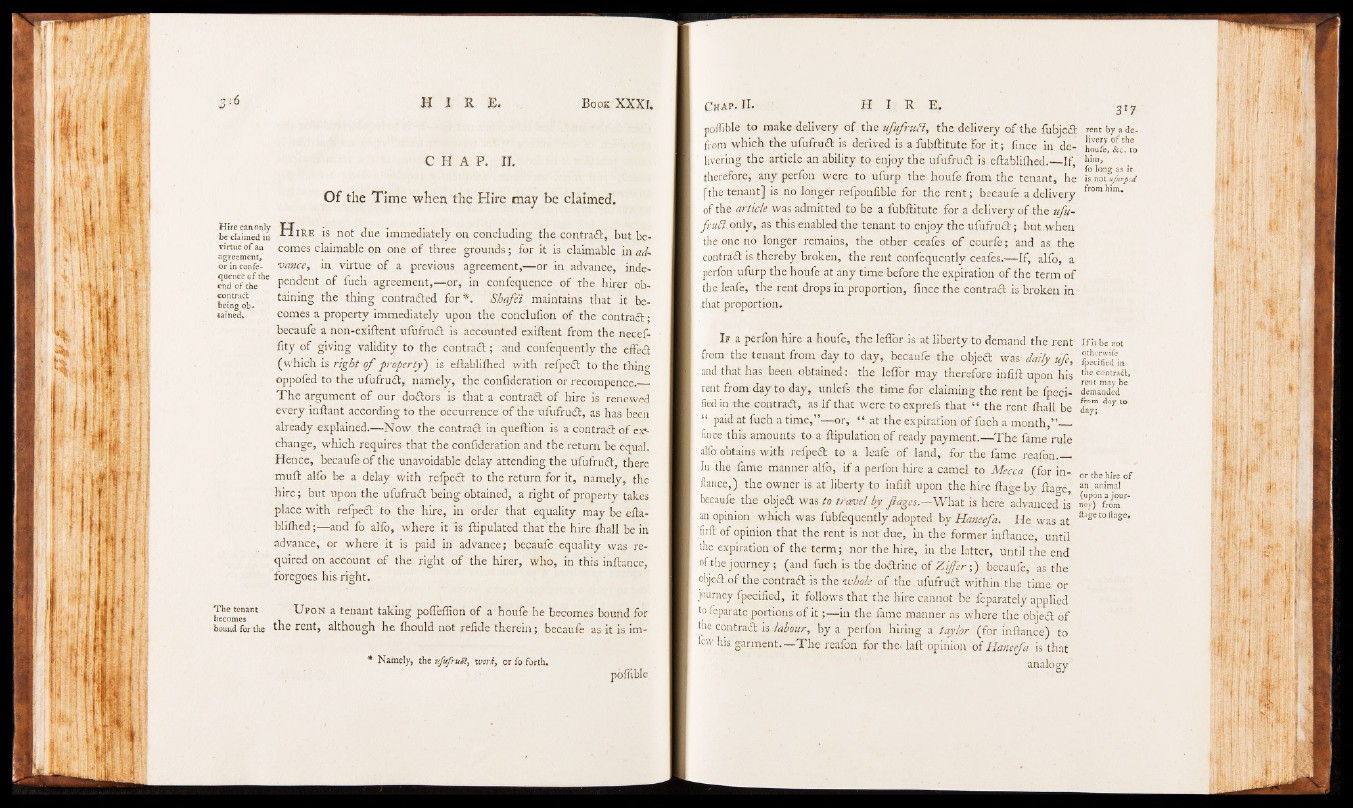
H I R E . Book XXXI,
H i r e c an o n ly
b e c la im e d in
v i r tu e o f a n
a g r e em e n t ,
o r in c o n fe -
q u e n c e o f th e
e n d o f th e
c o n t r a c t
b e in g o b tained
»
T h e t e n a n t
b e c om e s
b o u n d fo r th e
C H A P . II.
Of the Time when the Hire may be claimed.
H ire is not due immediately on concluding the contract, but becomes
claimable on one of three grounds; for it is claimable in ad-
vance, in virtue of a previous agreement,— or in advance, independent
of fuch agreement,— or, in eonfequence of the hirer obtaining
the thing contracted for Shqfe'i maintains that it becomes
a property immediately upon the conclufion of the contradt;
becaufe a non-exiftent ufufruct is accounted exiftent from the necef-
fity of giving validity to the contradt; and confequently the effedt
(which is right o f property) is eftabliftied ysdth refpedt to the thine
oppofed to the ufufruct, namely, the confideration or recompence._
T h e argument of our dodtors is that a contradt o f hire i| renewed
every inftant according to the occurrence of the ufiifrudl, as has been
already explained.— Now the contradt in queftion is a contradt of ex^
change, which requires that the confideration and the return be equal.
Hence, becaufe of the unavoidable delay attending the ufufrudt, there
mufl alfo be a delay with refpedt to the return for it, namely, the
hire; but upon the ufufrudt being obtained, a right of property takes
place with refpedt to the hire, in order that equality may be eita-
blilhed;— and fo alfo, where it is flipulated that the hire fhall be in
advance, or where it is paid in advance; becaufe equality was required
on account of the right of the hirer, who, in this inflance,
foregoes his right.
U pon a tenant taking poffeffion o f a houfe he becomes bound for
the rent, although he fhould not refide therein; becaufe as it is im-
* Namely, the ufitfruSt, or fo forth.
poffible.
poffible to make delivery of the ufufruft, the delivery of the fubjedi
from which the ufufrudt js derived is a fubflitute For i t ; fince in delivering
the article an ability to enjoy the ufufrudt is eflablifhed.— If,
therefore, any perfon were to ufurp the houfe from the tenant, he
[the tenant] is no longer refponfible for the rent; becaufe a delivery
of the article was admitted to be a fubflitute for a delivery of the ufu-
fruft only, as this enabled the tenant to enjoy the ufufrudt; but when
the one no longer remains, the other ceafes o f courfe; and as, the
contradt is thereby broken, the rent confequently ceafes.— If, alfo, a
perfon ufurp the houfe at any time before the expiration of the term of
the leafe, the rent drops in proportion, fince the contradt is broken in
that proportion.
If a perfon hire a houfe, the leffor is at liberty to demand the rent
from the tenant from day to day, becaufe the objedt was dqily ufe,
and that has been obtained: the leffor may therefore infill upon his
rent from day to day, unlefs the time for claiming the rent be fpeci-
fied in the contradt, as i f that were to exprefs that “ the rent fhall be
paid.at fuch a time,”— or, “ at the expiration of fuch a month,”_
fuse this amounts to a flipulation of ready payment.— The fame rule
alii« obtains with refpedt to a leafe of land, for the fame reafon.—
In the fame manner alfo, if a perfon hire a camel to Mecca (for in-
ilance,) the owner is at liberty to infift upon the hue flags by flao-e
becaufe the objedt was to travel by Jlages.— W hat is here advanced is
an opinion which was fubfequently adopted by Haneefa. He was at
firft of opinion that the rent is not due, in the former inflance, until
the expiration of the term; nor the hire, in the latter, until the end
of the journey; (and fuch is the dodtrine of Z iffe r ;) becaufe,-as the
ojjjedt of the contradt is the whole' o f the ufufrudt within the time, or
l|urney fpecified, it follows that the hire cannot be feparately applied
t| feparate portions o f i t ;— in the fame manner as where the objedt of
the contradt i$ labour, by a perfon hiring a taylor (for inflance! to
few his garment.— T h e reafon for the, lafl opinion of Haneefa is that
analogy
3 ! 7
r e n t b y a d e l
iv e r y o f th e
h o u f e , & c . to
h im ,
fo lo n g as i t
is n o t ufurped
fr om him»
I f i t b e n o t
o th e r iv i fe
fp e c if ie d in
th e co n t ra d t ,
r e n t m a y b e
d em a n d ed
f r om d a y to
d a y ;
o r th e h i r e o f
an a n im a l
(u p o n a jo u r n
e y ) from
ita g e to fta g e *